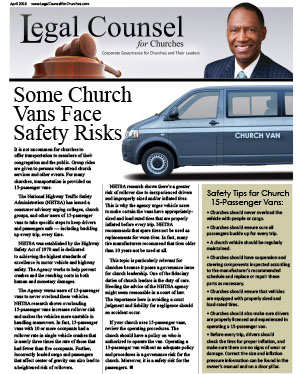Many churches, like other corporations, have the right to own property. The right to own property include the right to dispose of property. Some property transactions occur in the normal course of business. This may include the sale of books, tapes or trading a church vehicle. Occasionally, a church may have a need to dispose of a substantial portion of its property. This kind of transaction must be handled differently than sales in the normal course of business.
North Carolina law states that churches have a right to sell, lease, exchange, or otherwise dispose of all, or substantially all, of its property other than in the usual and regular course of its activities. The key language for the purposes of this article is “all or substantially all” of its property. This is often called a fundamental transaction.
A fundamental transaction must be on the terms and conditions determined by the church’s board of directors. Generally, this transaction must be approved 1) by the church board, 2) the members entitled to vote thereon by two-thirds of the votes cast or a majority of the votes entitled to be cast on the proposed transaction, whichever is less; and 3) in writing by any person or persons whose approval is required by a provision of the articles of incorporation or bylaws.
If the church is organized as to not have a statutory membership, the transaction shall be approved by a vote of a majority of the directors. The church shall provide at least five days’ written notice of any directors’ meeting at which such approval will be considered. The notice shall state that the purpose, or one of the purposes, of the meeting is to consider the sale, lease, exchange, or other disposition of all, or substantially all, of the property or assets of the corporation and contain or be accompanied by a description of the transaction.
If the church seeks to have the transaction approved by the members at a membership meeting, the church must give notice of the membership meeting to those members. The notice shall state that the purpose, or one of the purposes, of the meeting is to consider the sale, lease, exchange, or other disposition of all, or substantially all, of the property or assets of the church and contain or be accompanied by a description of the transaction.
The church board could have a fundamental transaction approved by the members through a written consent or written ballot. If the church seeks approval through a written ballot, the material soliciting the approval shall contain or be accompanied by a description of the transaction.
A church is required to give written notice to the Attorney General 30 days before it sells, leases, exchanges, or otherwise disposes of all, or a majority of, its property if the transaction is not in the usual and regular course of its activities. The Attorney General can give the Church a written waiver of this notice requirement in advance. This notice shall include all the information the Attorney General determines is required for a complete review of the proposed transaction. The Attorney General may require an additional 30-day period to review the proposed transaction by providing written notice to the church prior to the expiration of the initial notice period. During this 30-day period, the transaction may not be finalized.
A church has the right to change its mind after proposing a fundamental transaction. After a sale, lease, exchange, or other disposition of property is authorized, the transaction may be abandoned without further action by the members or any other person who approved the transaction. The abandonment of the transaction should be in accordance with any procedures set forth in the resolution proposing the transaction or in a manner determined by the board of directors.
The sale of all or substantially all of a church’s property must be handled differently from the sale of other assets. Church management should be careful to ensure all legal processes are followed. Proper diligence in carrying out the sale of church property is an important governance responsibility.

